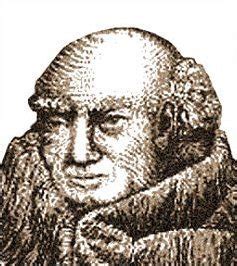A Quote by Immanuel Kant
Reason in a creature is a faculty of widening the rules and purposes of the use of all its powers far beyond natural instinct; it acknowledges no limits to its projects. Reason itself does not work instinctively, but requires trial, practice, and instruction in order gradually to progress from one level of insight to another.
Related Quotes
I would call the attention of the reader to the difference between "reason" and "reasoning." Reason is a light, reasoning a process. Reason is a faculty, reasoning an exercise of that faculty. Reasoning proceeds from one truth to another by means of argumentation. This generally involves the whole mind in labor and complexity. But reason does not exist merely in order to engage in reasoning. The process is a means to an end. The true fulfillment of reason as a faculty is found when it can embrace the truth simply and without labor in the light of single intuition.
The opposition of instinct and reason is mainly illusory. Instinct, intuition, or insight is what first leads to the beliefs which subsequent reason confirms or confutes; but the confirmation, where it is possible, consists, in the last analysis, of agreement with other beliefs no less instinctive. Reason is a harmonizing, controlling force rather than a creative one. Even in the most purely logical realms, it is insight that first arrives at what is new.
There are two excesses: to exclude reason, to admit nothing but reason. The supreme achievement of reason is to realise that there is a limit to reason. Reason's last step is the recognition that there are an infinite number of things which are beyond it. It is merely feeble if it does not go as far as to realise that.
I want to be remembered as an imaginer, someone who used his imagination as a way to journey beyond the limits of self, beyond the limits of flesh and blood, beyond the limits of even perhaps life itself, in order to discover some sense of order in what appears to be a disordered universe. I'm using my imagination to find meaning, both for myself and, I hope, for my readers."-Clive Barker
A living faith is always on trial; we call it faith for that reason. When I read in some alarmist book that the Christian faith is now on trial, or "at the crossroads," my impulse is to answer, Why Not? Does anybody know a time when the Christian faith was not on trial, or when the Christian life was a simple walkover, with neither principalities nor powers to dispute its advance?
For authority proceeds from true reason, but reason certainly does not proceed from authority. For every authority which is not upheld by true reason is seen to be weak, whereas true reason is kept firm and immutable by her own powers and does not require to be confirmed by the assent of any authority.
Let us become thoroughly sensible of the weakness, blindness, and narrow limits of human reason: Let us duly consider its uncertainty and endless contrarieties, even in subjects of common life and practice.... When these topics are displayed in their full light, as they are by some philosophers and almost all divines; who can retain such confidence in this frail faculty of reason as to pay any regard to its determinations in points so sublime, so abstruse, so remote from common life and experience?
To live and work successfully with others requires more than faithfulness to one's concrete aims. It requires an intellectual commitment to a type of order in which, even on issues which to one are fundamental, others are allowed to pursue different ends. It is for this reason that to the liberal neither moral nor religious ideals are proper objects of coercion, while both conservatives and socialists recognize no such limits.
One would wonder to hear skeptical men disputing for the reason of animals, and telling us it is only our pride and prejudices that will not allow them the use of that faculty. Reason shows itself in all occurrences of life; whereas the brute makes no discovery of such a talent, but in what immediately regards his own preservation, or the continuance of his species. Animals in their generation are wiser than the sons of men; but their wisdom is confined to a few particulars, and lies in a very narrow compass. Take a brute out of his instinct, and you find him wholly deprived of understanding.
To the one, a little natural moderation and quietness of temper may be sufficient to conduct us: but to the other, we can only attain by much discipline and slow advances; and when we think we have made great way, we shall often find reason to confess in the hour of trial, that we had greatly, far too greatly, over-rated our progress.
The physicist, in his study of natural phenomena, has two methods of making progress: (1) the method of experiment and observation, and (2) the method of mathematical reasoning. The former is just the collection of selected data; the latter enables one to infer results about experiments that have not been performed. There is no logical reason why the second method should be possible at all, but one has found in practice that it does work and meets with reasonable success.








































